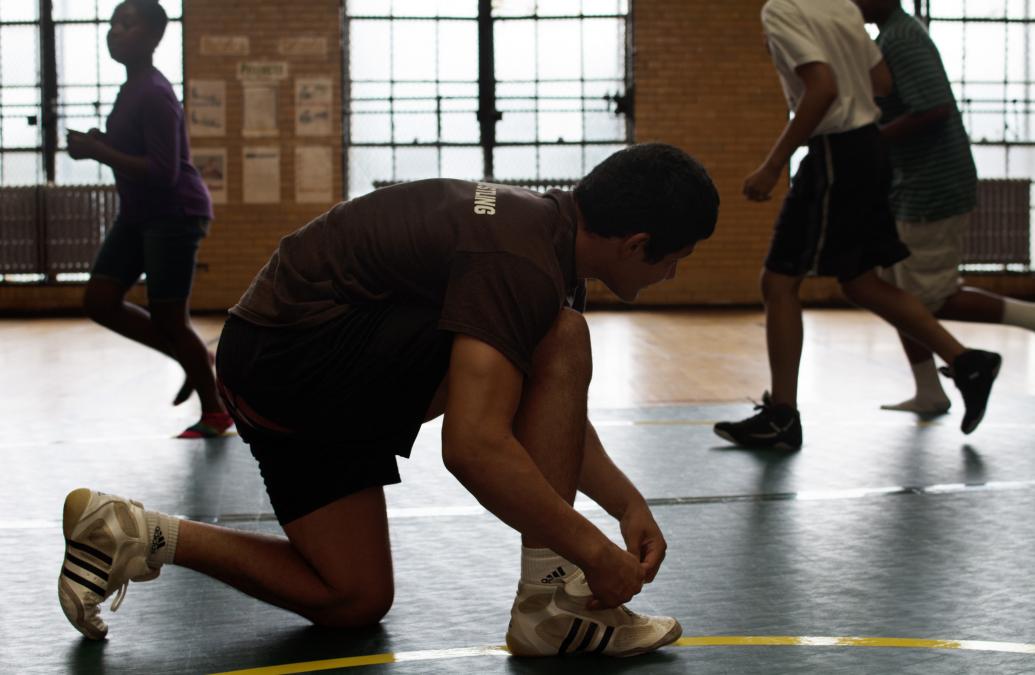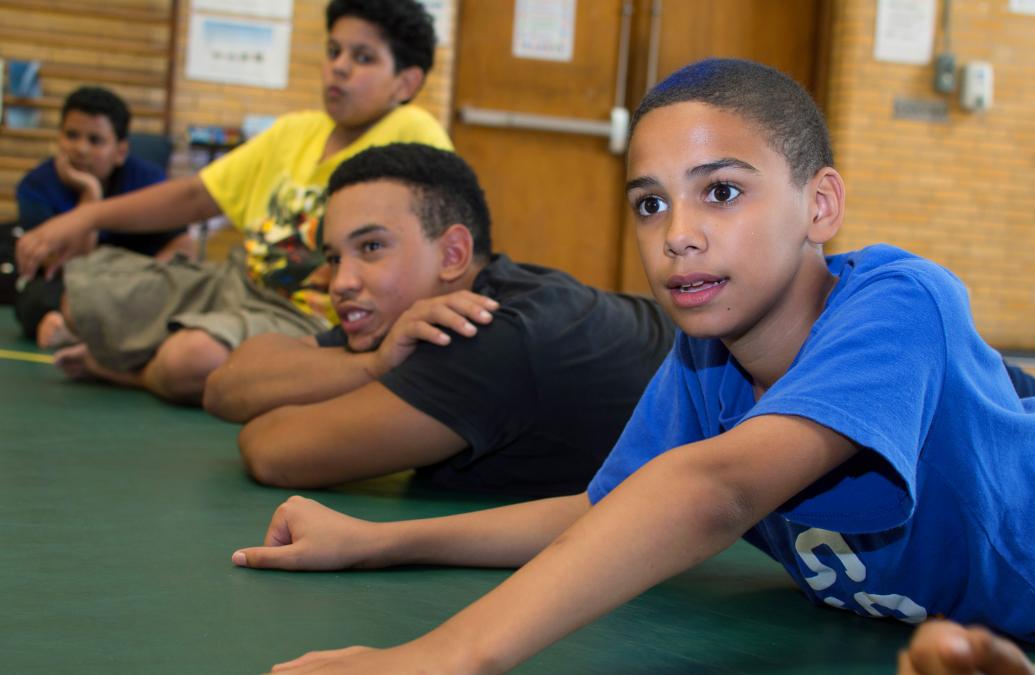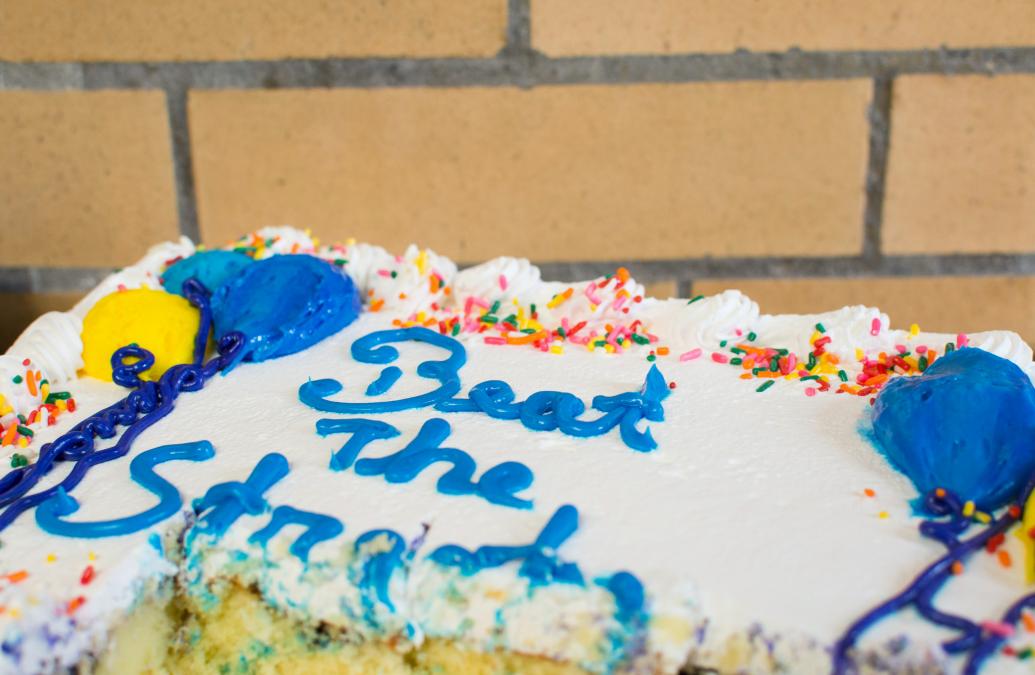Taking Down Underachievement in Providence Middle Schools

The wrestling room at Gilbert Stuart Middle School is not what I expected. I spent four and a half years practicing in the basement of my school's gym, where the pipes clanged and the mat and walls were slick with sweat by the end of practice. At Gilbert Stuart, light pours from tall windows onto a brand new mat. The ceiling is vaulted, and signs that read “Teamwork” and “Determination” are taped to the walls.

Joabel Celestin (back), age 15, and William Juarez, age 14, (front) cheerfully warm up before the kids arrive. They practice their setups and takedowns, their escapes and reversals. The two junior coaches became hooked on wrestling last fall, when Billy Watterson '15, the director of Beat the Streets Providence, came to their school to talk about wrestling. Watterson normally asks the middle schoolers if they had ever been on an actual team where they trained, worked hard and had fun together. He then asks them if they would like to represent their school, compete against other schools across the state, and become state champions. How could anyone refuse?

Pictured above from left to right: William Juarez, Joabel Celestin, and Richard Muniz '17 who wrestles at 165 lbs. for Brown University<br><br>Watterson, who wrestles at 125 lbs. on Brown University's team, took a break from school last year to build Beat the Streets PVD. USA Wrestling began Beat the Streets in 2004 in New York City, and programs have sprung up in 16 different cities, including Providence, where Watterson and his teammates have laid mats in 5 middle schools: Nathan Bishop, Ucap, Roger Williams, Del Sesto and Gilbert Stuart.

Muniz, the Summer Director, explains the need for these programs, “A lot of kids are unsupervised at home while their parents work. It’s better to get them here with their peers. They’re learning social independence at this age when kids are starting to differentiate themselves. This is a great way to find out who you are even if you’re only wrestling for ten weeks and decide ‘this isn’t for me.’”<br><br>Muniz’s words hit close to home for me. I stopped wrestling during my junior year of high school. I had a laughable record, but I attribute my work ethic in school and other endeavors to those years spent wrestling and running sprints on the mat. I would not feel the same about any other activity. Wrestling’s purity sets it apart from other individuals sports. There are no balls, racquets or swords – just you and the person across from you who weighs about the same. In wrestling, you get out what you put in.

Above: Coach Vic Calderone from Juanita Sanchez High school demonstrates a basic pinning technique <br><br>Watterson has gathered an inspiring team of college wrestlers, alums, coaches, and young graduates of the Providence program to recruit, mentor, and coach middle schoolers that are itching for structure. “We want to draw kids that aren’t ready to invest in themselves, who don’t think they can be leaders, who don’t think they need to do better in math or be better in school,” said Watterson in a Beat the Streets promotional video.

Juarez (left) has transcended as a junior coach. “I used to get in trouble a lot,” he says, “I bunked [skipped school]. Billy told me to come, and it changed my attitude. My grades went up tremendously.” Maintaining good academic standing and passing every class are requirements to continue in the program, and the coaches even help kids with their homework before practices during the school year.

When it comes to after school programs, Beat the Streets is sustainable and affordable. The only equipment needed is a mat, and Watterson recruits graduates like Juarez and Celestin to coach during the summer. “We see the mistakes that we used to make,” says Celestin, “and know how to do it right. The kids get us more than they actually get the coaches.” The junior coaches find themselves in a unique position. They teach the middle schoolers and learn from adult coaches and college wrestlers at the same time.

The values and enthusiasm of the coaches have a profound impact on middle schoolers such as Armani (right), age 11. “I like them all really, but the [headlock] is my favorite move. I really love to wrestle.” Vic Calderone, the head coach from Juanita Sanchez High school points out that not one of the sixteen kids this summer has dropped out. This retention rate is indicative of the Beat the Streets PVD in its entirety.

Today is the last summer session at Gilbert Stuart Middle School. I watch as cake and certificates follow the live wrestling matches at the end of practice. The kids look exhausted and proud as they leave for home on the bus. The impact that Watterson and the other coaches have on Providence middle schoolers is profound. They learn the values of hard work and discipline from role models of various ages.

Beat the Streets faces an uphill battle to lay a mat in every middle school in Providence and cover the costs of all the students, but the goal is not to make a pinning machine out of every boy and girl. Wrestling is simply an avenue to success.
In 2012, 440 students did not graduate in the Providence School District. Last year Billy Watterson, a senior on the Brown Wrestling team, established a local chapter of Beat the Streets, a national movement to bring wrestling programs to urban middle schools across the country. In less than one year, Beat the Streets PVD has built teams in five Providence schools. I attended the final summer practice at Gilbert Stuart Middle School to see why so many kids are taking to the mat.
